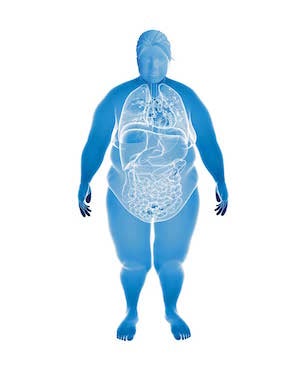LENS
Rising Risks
Obesity is shifting cancers to younger adults
 IMAGE: Adobe Stock
IMAGE: Adobe StockColorectal cancer, which most commonly strikes people after age 62, is increasing to an alarming extent in people half that age.
And the likely culprit appears to be obesity, which can begin in childhood, according to a recent study in the journal Obesity by Nathan A. Berger, MD, the HannaPayne Professor of Experimental Medicine at Case Western Reserve's School of Medicine.
"We're concerned that the worldwide obesity pandemic is going to become a worldwide cancer pandemic, and many of the obesity-promoted cancers will appear at earlier ages," said Berger, who compiled evidence from more than 100 publications.
Berger concentrated his study on the 13 cancers that are linked to body fat by the International Agency for Research on Cancer and that previously were not found in significant numbers in young adults. Berger also concluded that obesity not only increases the incidence of these cancers, but also accelerates their growth.
Obesity—which means having a body mass index greater than 30—can raise the risk of cancer because it often leads to chronic low-level inflammation, which in turn can cause DNA damage that can result in cancer, according to the National Institutes of Health. Excess fat tissue also leads to higher levels of estrogen, which is associated with breast, endometrial, ovarian and other cancers. And high levels of insulin—a common occurrence in the obese— may promote the development of colon, kidney, prostate, endometrial and other cancers.
Berger said the longer people are overweight, the higher their risk of developing cancer. While weight loss may not completely eliminate the cancer risk, it can reduce it, Berger said. That's why he believes it is critical for people who are obese to reduce their weight.
More than 650 million adults and 124 million children and adolescents across the world were obese in 2016, according to the World Health Organization. That's why Berger is so determined to educate people about the association between obesity and cancer.
"It's important we don't increase those numbers any more; that we prevent the development of obesity; and that we try to get people to reduce their obesity," said Berger. "If for nothing else than to prevent an epidemic of cancer in young adults."
CANCERS INCREASING IN YOUNG ADULTS
Below are eight obesity-related cancers typically found in people in the United States ages 45 and older that have been rising fastest in young adults in recent decades. The percentages of new cases in the 20- to 44-year-old age group follow.
Thyroid: 23.9%
Meningioma: 16.8% (tumor on the membrane covering the brain)
Ovarian: 10.6%
Breast: 10.5%
Kidney: 7.8%
Endometrial: 7.3%
Gastric Cardia: 6.2% (tumor at the top of the stomach where the esophagus enters)
Colon and Rectal: 5.8%
SOURCE: "Young Adult Cancer: Influence of the Obesity Pandemic," by Nathan A. Berger. Published in the Journal Obesity





